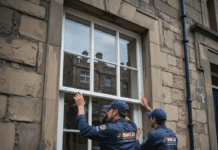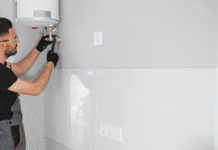In the realm of plumbing and wastewater management, the concept of drain lining stands as a revolutionary approach to repairing and refurbishing underground drainage systems. Among the many challenges faced by homeowners and property managers is the deterioration of pitch fibre pipes, a once-popular choice for drainage installations. In this comprehensive blog, we delve into the origins of pitch fibre pipes, the pitfalls they present, and how modern drain lining techniques have emerged as a game-changer in restoring and fortifying aging drainage networks. Join us on a journey through time and technology as we uncover the evolution from pitch fibre pipes to cutting-edge drain lining solutions.
Table of Contents
The Rise and Fall of Pitch Fibre Pipes
Unpacking the Legacy of Pitch Fibre Pipes
In the mid-20th century, pitch fibre pipes emerged as a cost-effective alternative to traditional clay and cast iron pipes. Composed of wood cellulose impregnated with coal tar pitch, these lightweight pipes offered ease of installation and resistance to corrosion.
The Achilles Heel of Pitch Fibre Pipes: Degradation and Instability
Despite their initial allure, pitch fibre pipes harbored a hidden flaw that would manifest over time. The unique construction of these pipes made them susceptible to deformation, blistering, and collapse, leading to widespread issues such as blockages, leaks, and structural compromise.
Legacy of the Past: Challenges Faced by Property Owners with Pitch Fibre Drainage Systems
Property owners with aging pitch fibre pipes often find themselves grappling with recurring drainage issues, rising maintenance costs, and the looming specter of complete pipe failure. The need for a durable and long-lasting solution to address the shortcomings of pitch fibre pipes became increasingly evident, paving the way for the emergence of modern drain lining technologies.
Embracing Innovation: The Evolution of Drain Lining Solutions
The Birth of Drain Lining: A Game-Changer in Drainage Rehabilitation
Amidst the challenges posed by deteriorating drainage systems, the advent of drain lining technology heralded a new era of repair and reinforcement for underground pipes. Drain lining involves the insertion of a flexible liner into the existing pipe, which is then cured in place to create a seamless, durable barrier against leaks and structural defects.
Modern Drain Lining Techniques: A Multifaceted Approach to Pipe Rehabilitation
- Cured-in-Place Pipe (CIPP) Lining: CIPP lining has become a popular choice for rehabilitating pipes of various materials, including clay, PVC, and yes, pitch fibre. This trenchless technology involves the insertion and curing of a resin-saturated liner within the existing pipe, resulting in a structurally sound and corrosion-resistant lining.
- Epoxy Lining: Epoxy lining offers a versatile and durable solution for repairing damaged pipes, including those made of pitch fibre. The epoxy resin forms a smooth, impermeable barrier within the pipe, enhancing flow capacity and extending the lifespan of the drainage system.
- Pipe Bursting: In cases where pipe replacement is necessary, pipe bursting technology allows for the extraction and replacement of the old pipe with minimal disruption to the surrounding landscape. This method is particularly effective in upgrading aging pitch fibre pipes to modern, more robust materials.
Looking to the Future: Sustainability and Efficiency in Drain Lining Practices
Integration of Green Technologies in Drain Lining
As the focus on sustainability and environmental responsibility grows, the drainage industry is embracing eco-friendly practices in drain lining solutions. From the use of recycled materials in liner production to the implementation of energy-efficient curing processes, the future of drain lining is aligned with a greener, more sustainable ethos.
Enhanced Efficiency through Digital Solutions
The digitization of drain lining operations has ushered in a new era of efficiency and precision. Advanced imaging technologies, predictive modeling software, and real-time monitoring systems are revolutionizing the way drain lining projects are planned, executed, and evaluated, leading to faster turnaround times and higher-quality outcomes.
Empowering Property Owners: Making Informed Decisions for Drainage Maintenance
Key Considerations for Property Owners with Pitch Fibre Pipes
- Assessment and Inspection: Conduct regular inspections of your drainage system to identify signs of degradation or damage in pitch fibre pipes. Early detection can help prevent costly repairs and mitigate the risk of major disruptions.
- Consultation with Drain Lining Experts: Seek advice from certified drain lining professionals to assess the condition of your pipes and explore tailored solutions that meet your specific needs and budget.
- Long-Term Maintenance Planning: Develop a comprehensive maintenance plan for your drainage system, including routine cleaning, inspections, and potential upgrades to modern drain lining solutions for enhanced durability and performance.
Conclusion: Bridging the Gap Between Past and Present in Drain Lining Technologies
In the ever-evolving landscape of drainage infrastructure, the transition from pitch fibre pipes to modern drain lining solutions represents a paradigm shift in the way we approach pipe rehabilitation and maintenance. By understanding the legacy of pitch fibre pipes, embracing innovative drain lining techniques, and prioritizing sustainability and efficiency in drainage practices, property owners can future-proof their drainage systems and ensure optimal performance for years to come.
As we navigate the complexities of underground drainage networks and the challenges they present, let us embrace the opportunities for transformation and progress that drain lining technologies afford. Together, we can bridge the gap between the past and present, forging a path toward resilient, sustainable, and efficient drainage solutions that stand the test of time.
Apart from that, if you are interested to know about Advantages of Trenchless Sewer Pipelining then visit our Home Improvement category.















